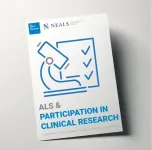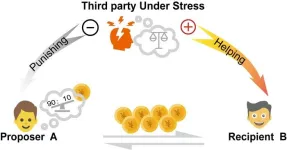(Press-News.org) CHAMPAIGN, Ill. — Large language model-based chatbots have the potential to promote healthy changes in behavior. But researchers from the ACTION Lab at the University of Illinois Urbana-Champaign have found that the artificial intelligence tools don’t effectively recognize certain motivational states of users and therefore don’t provide them with appropriate information.
Michelle Bak, a doctoral student in information sciences, and information sciences professor Jessie Chin reported their research in the Journal of the American Medical Informatics Association.
Large language model-based chatbots — also known as generative conversational agents — have been used increasingly in healthcare for patient education, assessment and management. Bak and Chin wanted to know if they also could be useful for promoting behavior change.
Chin said previous studies showed that existing algorithms did not accurately identify various stages of users’ motivation. She and Bak designed a study to test how well large language models, which are used to train chatbots, identify motivational states and provide appropriate information to support behavior change.
They evaluated large language models from ChatGPT, Google Bard and Llama 2 on a series of 25 different scenarios they designed that targeted health needs that included low physical activity, diet and nutrition concerns, mental health challenges, cancer screening and diagnosis, and others such as sexually transmitted disease and substance dependency.
In the scenarios, the researchers used each of the five motivational stages of behavior change: resistance to change and lacking awareness of problem behavior; increased awareness of problem behavior but ambivalent about making changes; intention to take action with small steps toward change; initiation of behavior change with a commitment to maintain it; and successfully sustaining the behavior change for six months with a commitment to maintain it.
The study found that large language models can identify motivational states and provide relevant information when a user has established goals and a commitment to take action. However, in the initial stages when users are hesitant or ambivalent about behavior change, the chatbot is unable to recognize those motivational states and provide appropriate information to guide them to the next stage of change.
Chin said that language models don’t detect motivation well because they are trained to represent the relevance of a user’s language, but they don’t understand the difference between a user who is thinking about a change but is still hesitant and a user who has the intention to take action. Additionally, she said, the way users generate queries is not semantically different for the different stages of motivation, so it’s not obvious from the language what their motivational states are.
“Once a person knows they want to start changing their behavior, large language models can provide the right information. But if they say, ‘I’m thinking about a change. I have intentions but I’m not ready to start action,’ that is the state where large language models can’t understand the difference,” Chin said.
The study results found that when people were resistant to habit change, the large language models failed to provide information to help them evaluate their problem behavior and its causes and consequences and assess how their environment influenced the behavior. For example, if someone is resistant to increasing their level of physical activity, providing information to help them evaluate the negative consequences of sedentary lifestyles is more likely to be effective in motivating users through emotional engagement than information about joining a gym. Without information that engaged with the users’ motivations, the language models failed to generate a sense of readiness and the emotional impetus to progress with behavior change, Bak and Chin reported.
Once a user decided to take action, the large language models provided adequate information to help them move toward their goals. Those who had already taken steps to change their behaviors received information about replacing problem behaviors with desired health behaviors and seeking support from others, the study found.
However, the large language models didn’t provide information to those users who were already working to change their behaviors about using a reward system to maintain motivation or about reducing the stimuli in their environment that might increase the risk of a relapse of the problem behavior, the researchers found.
“The large language model-based chatbots provide resources on getting external help, such as social support. They’re lacking information on how to control the environment to eliminate a stimulus that reinforces problem behavior,” Bak said.
Large language models “are not ready to recognize the motivation states from natural language conversations, but have the potential to provide support on behavior change when people have strong motivations and readiness to take actions,” the researchers wrote.
Chin said future studies will consider how to finetune large language models to use linguistic cues, information search patterns and social determinants of health to better understand a users’ motivational states, as well as providing the models with more specific knowledge for helping people change their behaviors.
Editor’s notes: To contact Michelle Bak, email chaewon7@illinois.edu. To contact Jessie Chin, email chin5@illinois.edu.
The paper “The potential and limitations of large language models in identification of the states of motivations for facilitating health behavior change” is available online. DOI: doi.org/10.1093
END
Study: Large language models can’t effectively recognize users’ motivation, but can support behavior change for those ready to act
Large language model-based chatbots can’t effectively recognize users’ motivation when they are hesitant about making healthy behavior changes, but they can support those committed to take action, say University of Illinois Urbana-Champaign researcher
2024-05-16
ELSE PRESS RELEASES FROM THIS DATE:
In September, securities watchdogs bark more, bite less
2024-05-16
AUSTIN, Texas -- The Securities and Exchange Commission acts as Wall Street’s traffic cop, fining companies for such infractions as securities fraud and insider trading. New research from Texas McCombs finds another parallel between the SEC and traffic enforcement: pressure to meet self-imposed quotas.
Assistant accounting professors Matthew Kubic and Sara Toynbee find that the agency files twice as many enforcement cases in September as in other months, a phenomenon they call the September spike. They also link the increase in cases to smaller fines that reduce what the government takes in from violators.
The reason for the ...
New guide demystifies participation in ALS clinical research
2024-05-16
As researchers search for new insights into Amyotrophic Lateral Sclerosis (ALS), there is an ever-greater need for data from clinical trials and research studies. However, many people living with ALS are not certain how to get involved with clinical research, and the demographics of current ALS clinical trial participants are not representative of the full population of people living with the disease worldwide.
To address the critical need for diversity and accessibility in ALS clinical trials and research studies, the Illinois-based Les Turner ALS Foundation has published a new ...
Lurie Children’s Hospital launches first peer-reviewed journal on health advocacy
2024-05-16
Ann & Robert H. Lurie Children’s Hospital of Chicago announces the launch of the Journal of Health Advocacy (JHA), the first of its kind peer-reviewed open access journal housed within the organization’s Patrick M. Magoon Institute for Healthy Communities. This new journal bridges the gap between knowledge and action to empower individuals and groups to address real-world challenges to health equity. It opened for submissions May 1, 2024.
“Disseminating and recognizing advocacy that is so often successful ...
Ochsner Health recognized as one of America’s Best Employers for Diversity by Forbes
2024-05-16
NEW ORLEANS, La. – Ochsner Health is proud to announce its recognition as one of America’s Best Employers for Diversity for 2024. This honor, awarded by Forbes in collaboration with market research firm Statista, places Ochsner Health among the elite 500 companies leading the way in diversity, equity and inclusion (DEI) initiatives within the United States.
Dedicated to enhancing access and opportunities for all its employees, Ochsner Health is a frontrunner in fostering a professional environment where diversity is celebrated, and every employee is empowered to contribute ...
Sex differences in primary care–based chronic kidney disease management
2024-05-16
About The Study: This study found significant sex differences in primary care–based chronic kidney disease management among patients at a care network affiliated with an academic medical center in the U.S., with females overall receiving worse care than males. Though many differences were of small magnitude, the disparity deserves further examination.
Corresponding Author: To contact the corresponding author, Jorge A. Rodriguez, M.D., email jarodriguez1@partners.org.
To access the embargoed study: Visit our ...
Under stress, an observer is more likely to help the victim than to punish the perpetrator
2024-05-16
Being stressed while witnessing injustice may push your brain towards altruism, according to a study published on May 14th in the open-access journal PLOS Biology by Huagen Wang from Beijing Normal University, China, and colleagues.
It takes more cognitive effort to punish others than it does to help them. Studies show that when witnessing an act of injustice while stressed, people tend to behave selflessly, preferring to help the victim than to punish the offender. This aligns with theories proposing that distinct brain networks drive intuitive, fast decisions and deliberate, slow decisions, ...
Ground-breaking accelerated discovery research unveils 21 novel materials for advanced organic solid-state laser technology: a global collaboration success story
2024-05-16
Organic solid-state lasers (OSLs) hold immense promise for a wide range of applications due to their flexibility, colour tunability, and efficiency. However, they are difficult to make, and with over 150,000 possible experiments required to conduct to find successful new materials, discovering them all would be the work of several lifetimes. In fact, in the previous few decades, only 10-20 new OSL materials have been tested. Researchers with the Acceleration Consortium based at the University of Toronto, took up this challenge and used self-driving lab (SDL) technology that, once set up, enabled them to synthesize and test over 1000 potential OSL materials ...
Otters, especially females, use tools to survive a changing world
2024-05-16
Sea otters are one of the few animals that use tools to access their food, and a new study has found that individual sea otters that use tools — most of whom are female — are able to eat larger prey and reduce tooth damage when their preferred prey becomes depleted.
The study researchers and their enlisted volunteer “otter spotters” followed 196 radio-tagged southern sea otters off the coast of California to better understand how the threatened species uses tools in a rapidly changing environment. The research team from The University ...
Military physicians give high-ranking military patients preferential treatment over lower-ranking patients
2024-05-16
Military physicians give patients whose military rank is higher better treatment than those who rank lower, according to a new study involving 1.5 million patient encounters. The findings provide evidence that the powerful enjoy better resources and support in a clinical context, often at the expense of the less powerful. “Our concern does not lie with the doctor-patient power imbalance itself, which is likely necessary for effective physician performance,” write the authors. “Rather, it lies with the inequitable variation in how that power is exercised, with the most vulnerable patients likely bearing the burden of this disparity, as ...
Tool use promotes foraging success and dental health in sea otters
2024-05-16
Using tools, like shells and rocks, to open their often thick-shelled mollusk prey increases foraging success in sea otters and protects their teeth from damage by allowing the animals to eat prey that would otherwise be difficult to obtain. The findings suggest that this behavior is a necessity for the survival of some otters in environments where competition is high and preferred prey is in short supply. Sea otters are well-known tool users. Aside from crushing prey with their teeth, sea otters have been observed using rocks, shells, human litter, and even the hulls of boats to bash open hard prey, including ...
LAST 30 PRESS RELEASES:
Bug beats: caterpillars use complex rhythms to communicate with ants
High-risk patients account for 80% of post-surgery deaths
Celebrity dolphin of Venice doesn’t need special protection – except from humans
Tulane study reveals key differences in long-term brain effects of COVID-19 and flu
The long standing commercialization challenge of lithium batteries, often called the dream battery, has been solved.
New method to remove toxic PFAS chemicals from water
The nanozymes hypothesis of the origin of life (on Earth) proposed
Microalgae-derived biochar enables fast, low-cost detection of hydrogen peroxide
Researchers highlight promise of biochar composites for sustainable 3D printing
Machine learning helps design low-cost biochar to fight phosphorus pollution in lakes
Urine tests confirm alcohol consumption in wild African chimpanzees
Barshop Institute to receive up to $38 million from ARPA-H, anchoring UT San Antonio as a national leader in aging and healthy longevity science
Anion-cation synergistic additives solve the "performance triangle" problem in zinc-iodine batteries
Ancient diets reveal surprising survival strategies in prehistoric Poland
Pre-pregnancy parental overweight/obesity linked to next generation’s heightened fatty liver disease risk
Obstructive sleep apnoea may cost UK + US economies billions in lost productivity
Guidelines set new playbook for pediatric clinical trial reporting
Adolescent cannabis use may follow the same pattern as alcohol use
Lifespan-extending treatments increase variation in age at time of death
From ancient myths to ‘Indo-manga’: Artists in the Global South are reframing the comic
Putting some ‘muscle’ into material design
House fires release harmful compounds into the air
Novel structural insights into Phytophthora effectors challenge long-held assumptions in plant pathology
Q&A: Researchers discuss potential solutions for the feedback loop affecting scientific publishing
A new ecological model highlights how fluctuating environments push microbes to work together
Chapman University researcher warns of structural risks at Grand Renaissance Dam putting property and lives in danger
Courtship is complicated, even in fruit flies
Columbia announces ARPA-H contract to advance science of healthy aging
New NYUAD study reveals hidden stress facing coral reef fish in the Arabian Gulf
36 months later: Distance learning in the wake of COVID-19
[Press-News.org] Study: Large language models can’t effectively recognize users’ motivation, but can support behavior change for those ready to actLarge language model-based chatbots can’t effectively recognize users’ motivation when they are hesitant about making healthy behavior changes, but they can support those committed to take action, say University of Illinois Urbana-Champaign researcher




